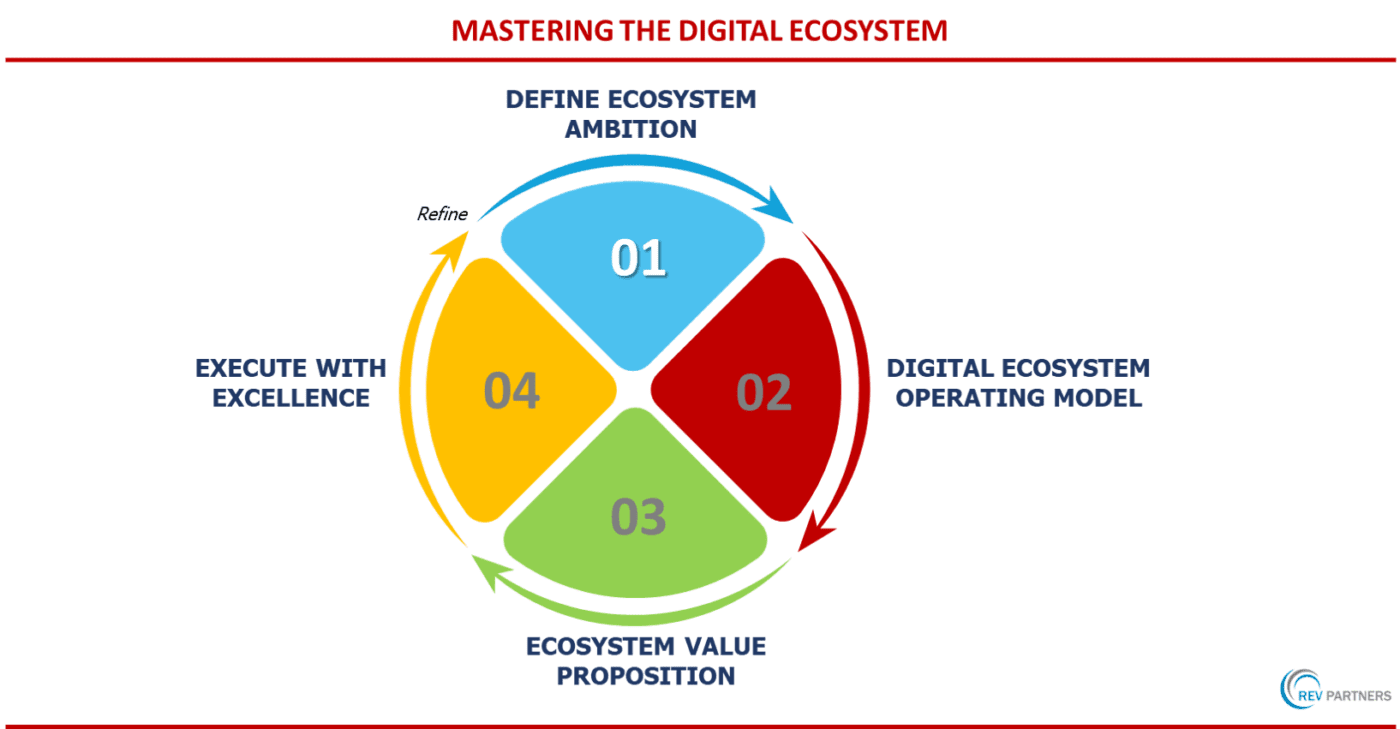T
he digital ecosystem is an ever-evolving network of interconnected entities, including organizations, individuals, and technologies. It is increasingly becoming a vital component of business strategies as companies seek to harness its potential to drive innovation, growth, and competitive advantage. However, navigating the complexities of the digital ecosystem requires a strategic approach and a deep understanding of the factors that influence success. In this article, we will explore four key strategies for orchestrating the digital ecosystem and realizing its full potential.

1: Define Your Ecosystem Ambition
Set Clear Objectives
The first step in mastering the digital ecosystem is to define your organization’s ambition. This requires setting clear objectives that outline the desired outcomes and the role the digital ecosystem will play in achieving them. Establishing well-defined goals will provide direction for your ecosystem efforts and ensure that all stakeholders are aligned with the organization’s vision.
Identify the Right Ecosystem Opportunity
With your objectives in place, it’s crucial to identify the specific opportunities for value creation within the digital ecosystem. This may involve evaluating potential partnerships, assessing new market opportunities, or uncovering areas for technological innovation. By identifying these opportunities, you can prioritize your efforts and allocate resources effectively.
To maximize the benefits of participating in a digital ecosystem, it is essential to identify the right ecosystem opportunity that aligns with your organization’s strategic objectives, market position, and core competencies. Conduct a thorough analysis of the competitive landscape, customer needs, and emerging trends to pinpoint the most promising opportunities for your organization. Consider both existing ecosystems in which your organization can play a role, as well as potential new ecosystems that you can help create or shape.
…identify the right ecosystem opportunity that aligns with your organization’s strategic objectives, market position, and core competencies.
Evaluate the Competitive Landscape
Understanding the competitive landscape is essential for setting realistic ambitions and positioning your organization for success. Analyze the strengths and weaknesses of your competitors, as well as the strategies they are employing within the digital ecosystem. This will enable you to identify gaps in the market, capitalize on your unique strengths, and differentiate your offering.
2: Develop Your Digital Ecosystem Operating Model
Align Leadership and Governance
A well-designed governance structure is crucial for orchestrating your digital ecosystem effectively. This includes defining roles and responsibilities, decision-making processes, and the framework for collaboration among ecosystem partners. Establishing a clear governance structure will help ensure that your organization is agile and able to respond quickly to changes within the ecosystem.
Achieving your ecosystem ambition requires strong leadership and governance to drive decision-making, resource allocation, and performance management. Ensure that your organization’s leadership team is aligned and committed to your ecosystem objectives, and establish a governance structure that enables effective collaboration, coordination, and oversight of ecosystem-related activities.
Foster a Culture of Collaboration
Cultivating a culture of collaboration is essential for success in the digital ecosystem. This involves promoting open communication, knowledge sharing, and a willingness to work together towards common goals. Encourage collaboration both within your organization and with external partners to drive innovation and create value.
Optimize Resource Allocation
Efficient resource allocation is vital for ensuring the sustainability and success of your digital ecosystem efforts. Develop processes for prioritizing projects, allocating resources, and tracking progress against your objectives. This will enable your organization to optimize its investments and maintain focus on high-impact initiatives.
Design a Collaborative Ecosystem Architecture & a Robust Platform
A well-designed ecosystem architecture is critical for enabling seamless collaboration among ecosystem participants. Develop a robust platform that facilitates the integration of various digital services, allowing your organization and its partners to co-create value effectively.
Ensure Data Security and Privacy
Data security and privacy are paramount in the digital age. Establish stringent security measures to protect sensitive information and maintain user trust. Additionally, create transparent data governance policies to ensure data privacy and compliance with relevant regulations.
3: Shape the Ecosystem Value Proposition
Develop a Platform Strategy
A well-defined platform strategy is critical for success in the digital ecosystem. Determine whether your organization will build its own platform, leverage existing platforms, or collaborate with partners to create a shared platform. Assess the potential benefits, risks, and resource requirements associated with each option, and select the approach that best supports your ecosystem ambition and objectives.
A well-defined platform strategy is critical for success in the digital ecosystem. Determine whether your organization will build its own platform, leverage existing platforms, or collaborate with partners to create a shared platform.
Understand Your Customers’ Needs
In order to create a compelling value proposition for your digital ecosystem, you must have a deep understanding of your customers’ needs and preferences. Conduct thorough research to identify the pain points and desires of your target audience, and leverage this insight to inform your ecosystem strategy.
Leverage Your Unique Assets
Your organization’s unique assets can be a powerful differentiator in the digital ecosystem. Identify the resources, capabilities, and expertise that set your organization apart, and determine how they can be leveraged to create value for your customers. This may involve developing new products or services, enhancing existing offerings, or creating synergies with ecosystem partners.
Develop a Compelling Value Proposition
With a clear understanding of your customers’ needs and your unique assets, you can develop a compelling value proposition that resonates with your target audience. This involves articulating the benefits your organization and its ecosystem partners can deliver, and effectively communicating this value to your customers. A strong value proposition will help you attract and retain customers, as well as differentiate your organization within the digital ecosystem.
Within the digital ecosystem, your organization may assume various roles, such as orchestrator, complementor, or infrastructure provider. Define your organization’s role and the capabilities needed to succeed in that role, considering factors such as your core competencies, market position, and strategic objectives. Ensure that your operating model is designed to support the successful execution of your chosen role
4: Execute with Excellence
Drive Continuous Innovation
In the fast-paced digital ecosystem, continuous innovation is essential for maintaining a competitive edge. Foster a culture of experimentation and embrace a fail-fast mindset that encourages learning from mistakes. Implement processes that support rapid iteration and ongoing improvement, and invest in the development of new capabilities that will drive future growth.
Establish Robust Performance Metrics
Measuring the performance of your digital ecosystem initiatives is critical for ensuring ongoing success. Establish robust performance metrics that align with your strategic objectives, and use these to track progress, identify areas for improvement, and inform decision-making. Regularly review and adjust your metrics as your ecosystem evolves to ensure they remain relevant and effective.
Engage Ecosystem Partners
Engaging and collaborating with ecosystem partners is key to driving value and achieving your strategic objectives. Develop strong relationships with partners by aligning interests, sharing knowledge, and working together to co-create innovative solutions. Foster trust and transparency to ensure long-term, mutually beneficial relationships.
Drive Change Management
Successfully executing your digital ecosystem strategy may require significant changes within your organization. Develop a comprehensive change management plan that addresses potential barriers to success, such as resistance to new ways of working, the need for new skills, or the integration of new technologies. Communicate the benefits of change and provide the necessary support and resources to help your organization adapt and thrive in the digital ecosystem.
In Summary, mastering the digital ecosystem is a complex and ongoing endeavor that requires a strategic approach and a deep understanding of the factors that influence success. By defining your ecosystem ambition, developing an effective operating model, shaping a compelling value proposition, and executing with excellence, your organization can harness the power of the digital ecosystem to drive innovation, growth, and competitive advantage. We recommend leveraging these four key strategies to effectively orchestrate your digital ecosystem and realize its full potential.
——————————————————————————————————————————-
ABOUT REV PARTNERS
REV Partners. Business Transformation Experts. Digital Transformation Experts. We are a Management Consulting & Advisory firm. We help Fortune 500 & Private Equity clients address the most pressing issues related to Transformation, Strategy, Operations, Organization and Digital. We can also provide experienced experts as Interim “Chief Transformation Officer” or equivalent, to accelerate, lead and execute ambitious Business Transformation or Digital Transformation programs. If you or your organization need support, please contact us, follow us on Twitter, or Email us at: meet@revpartners.com.
© REV Partners. All Rights Reserved

